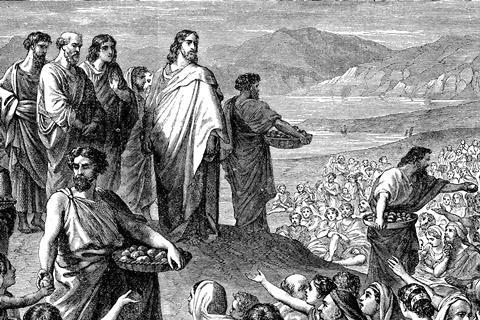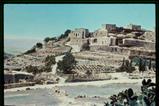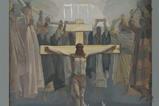Elaine Storkey unpacks the biblical passages which show us that God intends for us to not only rest, but also enjoy our leisure time. She encourages us to see how opportunities to extend God’s kingdom can come from them too

For many years I was the director of the London Institute for Contemporary Christianity, whose home is the beautiful St Peter’s Church in the middle of London’s busy Oxford Street. In such a central location, round the corner from BBC Broadcasting House, our timetable was packed. We ran courses accredited by the University of London, provided training for lay people, produced a magazine, did broadcasts with the BBC and hosted many Christian groups who joined our autumn and summer schools. As executive director my life was very busy, with responsibilities that stretched way beyond the building. After we were invited to run our Christian education programmes across the UK and into Europe, regular travelling and preaching became part of my job.
On one particularly hectic afternoon, the Institute’s president dropped in to see me. He asked how much leisure I was managing to get into my lifestyle. This was the very last question I was expecting from him and I had to admit that the answer was almost none. He did not seem very impressed. “Leisure is part of a biblical lifestyle,” he reminded me. The next day I was surprised to find an envelope on my desk enclosing five theatre vouchers. A note with it suggested I might take the whole family along to the West End production of Les Misérables – a suggestion received by those at home with great enthusiasm!
I made sure I was always available for my family, but time for ordinary leisure had completely dropped out of view
This kind gesture highlighted a weakness in my work-life balance. I made sure I was always available for my family, but time for ordinary leisure had completely dropped out of view. Our president was a renowned teacher, author and evangelist, who travelled the world and established many Christian initiatives, yet he believed that ample time out was essential in his calling before God. Scheduling rest and leisure into his timetable not only gave him opportunity to enjoy hospitality and be refreshed, it also kept him in contact with the very culture we were reaching out to.

Misunderstanding the God-ordained natural rhythm of life
Rest and leisure are necessary to our humanness. God has structured rest into creation. We see this in the first chapter of Genesis. God gave six days to the process of creating the world, and then rested on the seventh. The Sabbath is God’s gift to us also: time away from work where we can enjoy peace and restoration. It is something Jewish people have always treasured, with the greeting “Shabbat Shalom” marking the high point of the week.
Yet the Bible also illustrates how the Sabbath provision could be misunderstood. Legalists interpreted it as a day of deprivation, where normal pleasures were forbidden and worshippers weighed down with crippling rules. Joy and peace were largely absent. That’s why the prophet Isaiah pointed to the hypocrisy of leaders making a big fuss about fasting while ignoring basic issues of justice and oppressing the poor. Far better, he said, to seek justice and call the Sabbath a delight; then they would find the joy God had for them (Isaiah 58).
Jesus’ leisure was often time gladly given to others
Jesus also took on the legalists of his day and regularly exposed their hypocrisy and the burdens they laid on others. When the Pharisees criticised his disciples for plucking ears of corn during their walk on the Sabbath, Jesus pointed out that “the Sabbath was made for man, not man for the Sabbath” (see Mark 2:23-28). He happily celebrated the Sabbath himself by bringing healing and renewal to people.
The Bible doesn’t restrict rest to the one Sabbath day a week, however. It is to be built into our lifestyle. The Gospels recall several occasions when Jesus encouraged his friends to take time out. When Martha was wearing herself out providing hospitality, and pleaded with Jesus to get her sister to help, he resisted. Instead, he urged her not to overdo the preparation, and praised Mary’s decision to rest and listen! (Luke 10:40-42). On another occasion when his disciples shared all they had been doing, he recognised how much they needed a break: “So many people were coming and going that they did not even have a chance to eat.” Jesus urged them to take a boat ride with him to a quiet place for some rest. The outcome was a chance for the disciples to recharge their batteries and for Jesus to teach more people and feed a crowd of 5,000. (see Mark 6:12-13, 30-44).
Finding leisure activities in the Bible
It’s easy to make a biblical case for a lifestyle that concentrates on rest. But what about other aspects of leisure? Some pursuits are straightforward: hanging out with friends, enjoying hospitality, writing stories, doing creative arts, music, sport – all these are a rich part of normal life, and are celebrated in both the Old and New Testaments. Eating food together is important in all Jewish high-days and holidays – reminiscent of the meal on Mount Sinai when the leaders of Israel were invited to eat with God, after their release from slavery in Egypt (Exodus 24:9-11). In the Gospels Jesus frequently went to parties and hung out with all kinds of people. The Pharisees who didn’t approve of his activities or his dubious company scorned him as a “glutton and a drunkard, a friend of tax collectors and sinners” (Matthew 11:19). Jesus’ leisure was often time gladly given to others. His first miracle was at a wedding, replenishing the supply of wine and saving the reputation of the host (John 2:1-11).
When we turn to other leisure activities – arts, crafts, music – we find these too are often described in the Bible. The early Israelites were given the task of building a tabernacle and women skilled in weaving or spinning were invited to use their skills to adorn it with crafts made from scarlet fabrics and goats’ hair (Exodus 35:25-6). Others designed gold, silver and bronze objects and engaged in “all kinds of artistic crafts” (v33). We read of people playing trumpets, lyres, horns, tambourines, pipes and cymbals. And we have actual examples of the poetry and writings of King David in the book of Psalms.
Yet the biblical writers issued warnings too about the wrong use of leisure. It could even lead to idolatry, such as when the Israelites made a golden calf and worshipped it in Exodus 32. In the early Church, Paul cautioned people not to end up conforming to the culture around them, but to transform it (Romans 12:1-2). And at the most basic level, Christians were not to use their leisure time in gossiping, idleness or busy-bodying around!
How do we apply all this today?
Our culture is very different from any of those in the scriptures, yet the underlying biblical message applies as much to us today as it did then. We are to live integrated lives where worship, family, work, rest, social involvement and leisure all engage with one other and draw us closer to God. We are to avoid obsessions that threaten to become all-consuming in our lives, but we are also to allow ourselves time to spend in those things that interest us and give us pleasure.
Jesus gives us the task of being salt and light (Matthew 5:13-16), transformers of the world we live in, and our leisure time and lifestyles can help us in that. For our leisure interests can develop hidden areas of life and help them to flourish. In many small ways we can enrich our culture and make the world more beautiful. What’s more, our leisure pursuits can bring us into contact with people we would not meet under other circumstances. With mutual appreciation for shared interests, we can contribute to others’ lives.
I have a friend who took up origami when her children were small, because she could mess about with paper while they were crayoning. Fifteen years on she is an accomplished artist in this area, has a portfolio of designs and runs clubs for like-minded people. She finds that having a common interest not only helps her to relate to others, but also opens doors into people’s hearts. She is known as someone always ready to listen and pray for those who ask. For her, there is no dichotomy between being a Christian and sharing her passion for folding paper!
Theatre and film have been two of the leisure areas that I have given much time to. They offer insight into the values of our contemporary culture and what makes people tick, in a similar way in which visiting Athens helped St Paul understand the pagan Greeks. I’ve also come to appreciate the craft of some non-Christian film producers and directors – several of whom are ready to grapple with issues of faith in their work. This ‘hobby’ led me to develop courses on film and theology, attended often by groups of people unrelated to the Church.
Whatever our leisure, God can bless us through it, and enrich our lives and relationships with others. Even more, the Holy Spirit can use it in mission, revealing God’s own creative love and extending his kingdom on earth.
Elaine Storkey is a lecturer, writer and broadcaster. Her book Women in a Patriarchal World (SPCK, 2020) was based on Woman Alive articles. Her most recent book is Meeting God in Matthew (SPCK)

































No comments yet